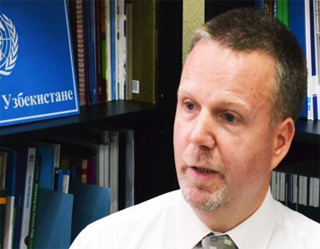Tashkent, Uzbekistan (UzDaily.com) --
Asmus Hammerich, the WHO Representative in Uzbekistan outlined the plans and priorities of his organization for Uzbekistan in 2014.
This is part of the “UN Heads Up” series organized by the UN Information Office where heads of UN Agencies operating in the country inform public about priority areas of cooperation with the government in the beginning of each year.
According to Dr. Hammerich, the WHO’s cooperation with the government this year is framed within the Bilateral Agreement 2014-15 with the Ministry of Health which promotes population health and reduces health inequality. The document has been developed in a consultative manner, and is based on the best national and international evidence. In line with the new European Health Policy Health 2020 it suggests the following priority actions for policymakers to:
- invest into the health sector, through a live course approach and through empowering people,
- tackle regions’ most prominent health challenges,
- strengthen people-centered health systems and
- to create resilient communities and supportive environments.
- How will WHO support the implementation of these priorities?
The Organizations looks to the implementation of these priorities through strengthening collaboration with a focus on:
- non-communicable diseases (diabetes, cancers, heart diseases and lung diseases, and their risk factors such as tobacco and alcohol control, mental health, but also on violence and injury prevention and nutrition),
- communicable diseases ( HIV/AIDS, TB, and vaccine preventable diseases),
- health throughout the life-course approach ( which focuses on maternal- child health, but also on the broader issue – reproductive health and the social determinants of health, which may be lying in other sectors such as gender, or poverty or the environment),
- strengthening the national health system – by supporting the government in developing evidence based national policies, strategies and plans, or provide integrated people centered services and to provide best evidence and strengthen information system, and
- preparedness, surveillance and response that would include for example strengthening the alert and response capacity of government, help Uzbekistan to implement the international health regulations, strengthening laboratories to prevent outbreaks, to ensure food safety and maintain polio eradication.
